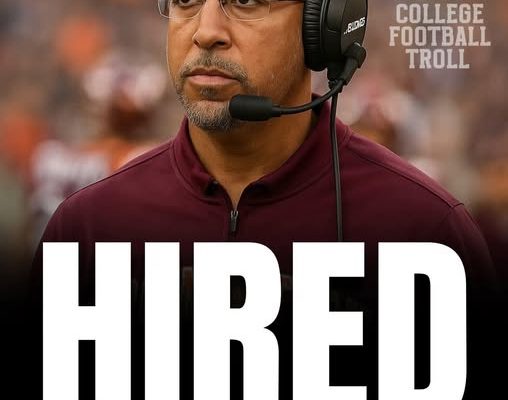BREAKING NEWS: According to multiple sources, James Franklin has reportedly reached an agreement to become the next head coach of the Virginia Tech Hokies, a move that has sent shockwaves throughout college football and reignited excitement across Blacksburg. The reported contract, valued at approximately $11 million per year, marks a major investment by Virginia Tech in its football future and symbolizes a new era for a program that has long been seeking to reestablish itself among the elite in the ACC and beyond.
For James Franklin, this move represents both a new challenge and an opportunity for redemption. After a decade at Penn State, where he achieved significant success but also faced criticism for inconsistency in marquee games, Franklin’s decision to take the Virginia Tech job suggests a desire for a fresh start in a program ready to embrace a modern identity. Franklin’s leadership, recruiting prowess, and charismatic approach to program-building have made him one of the most recognizable coaches in the country. Now, those same qualities will be tested in a new environment — one with passionate fans, deep-rooted traditions, and a hunger to return to national relevance.
Virginia Tech’s decision to pursue Franklin at such a high price tag underscores how serious the university’s leadership is about revitalizing Hokies football. Since the departure of legendary coach Frank Beamer in 2015, Virginia Tech has struggled to find stability. Justin Fuente’s tenure began with promise but ultimately fizzled out, and while Brent Pry made strides in rebuilding the culture and defensive identity, the results on the field never quite matched expectations. The Hokies have hovered around mediocrity for years — flashes of potential followed by frustrating collapses. Bringing in Franklin, a proven winner and dynamic recruiter, signals that Virginia Tech is tired of waiting for incremental progress. They want to win now.
Franklin’s reported $11 million annual salary puts him among the highest-paid coaches in college football, on par with the sport’s most elite figures. It’s a bold financial move for a program that historically hasn’t competed with SEC or Big Ten schools in spending power. Yet, this is the landscape of modern college football — one where investment in coaching, facilities, and player development directly correlates with national success. For Virginia Tech’s boosters and athletic department, this hire is more than just about on-field performance. It’s a statement that the Hokies intend to reclaim their place as a national brand capable of competing with Clemson, Florida State, and the rising powers in the new-look ACC.
The decision to hire Franklin also aligns with a broader trend across college football, where traditional powers in transitional phases seek proven head coaches with big-program experience to accelerate their rebuilds. For Virginia Tech, whose fanbase has endured nearly a decade of disappointment, this move will likely be met with jubilation — and high expectations. Franklin’s reputation as a motivator and his history of attracting top-tier talent could immediately reshape the Hokies’ recruiting landscape, especially across the Mid-Atlantic and Southeast regions.
At Penn State, Franklin was known for his relentless recruiting energy and ability to connect with players, parents, and coaches alike. Under his watch, the Nittany Lions routinely secured top-15 recruiting classes and developed a number of NFL-caliber players. He rebuilt the Penn State program in the shadow of the post-Sandusky era, guiding the team to a Big Ten Championship in 2016 and multiple New Year’s Six bowl appearances. Those achievements showed his ability to lead a major program under pressure — an experience that will serve him well in Blacksburg, where expectations to return to national prominence will be immediate.
What makes this move especially fascinating is how it reshapes the ACC landscape. With Clemson still the gold standard and Florida State resurging under Mike Norvell, Virginia Tech has been searching for a foothold. The addition of Franklin could give the Hokies that missing spark — a charismatic, high-energy leader who can attract top recruits, command media attention, and instill belief across the program. Franklin’s track record in developing quarterbacks and explosive offenses could also help rejuvenate a Hokies team that has often relied on defense and special teams to stay competitive.
Behind the scenes, the financial and logistical implications of Franklin’s hiring are massive. Virginia Tech’s decision to pay $11 million per year for a head coach — an unprecedented figure for the school — required the backing of major donors and likely a renewed commitment from the athletic department toward facility upgrades, NIL competitiveness, and long-term program investment. In an era where college football success increasingly hinges on alignment between coaches, boosters, administrators, and collectives, the Hokies appear to be signaling their willingness to play at the highest level.
For Franklin himself, the move could redefine his legacy. At Penn State, he was both celebrated and scrutinized — beloved for reviving the program but criticized for falling short against the likes of Michigan and Ohio State. At Virginia Tech, he steps into a conference where the path to the playoff may be slightly more accessible, especially in the evolving College Football Playoff landscape. With the new 12-team playoff system set to debut, Virginia Tech’s chances of qualifying under Franklin’s leadership could dramatically increase if the Hokies can win 10 or 11 games and compete for an ACC title.
Early reports suggest that Franklin will bring several key members of his Penn State staff with him to Blacksburg, including offensive coordinator Mike Yurcich and strength coach Chuck Losey. That continuity could be vital in establishing a fast start for the program. Franklin’s staff has been known for its emphasis on player development, high-intensity practices, and analytical preparation — traits that could help the Hokies quickly modernize their football operations.
Recruiting, too, will immediately take center stage. Virginia Tech sits in a region rich with high school football talent, including powerhouse states like Virginia, North Carolina, and Maryland. For years, the Hokies have struggled to keep elite in-state recruits from leaving for programs like Penn State, North Carolina, and Georgia. Franklin’s recruiting network and personality could reverse that trend, bringing Virginia’s top prospects back home. The idea of the Hokies once again becoming a destination for five-star and high four-star talent will undoubtedly excite fans and alumni alike.
The ripple effects across the college football landscape will be substantial. Penn State, now without Franklin, will suddenly find itself searching for a new leader at a time when stability is crucial. The Nittany Lions are still well-positioned, with a talented roster and strong recruiting infrastructure, but losing a coach of Franklin’s caliber will be a major transition. For the Big Ten, it’s another reminder of the shifting tides in college football — where money, opportunity, and fit can lure even well-established coaches away from top-tier programs.



